(完整版)高中英语人教版必修一课文内容电子版Unit2
人教版英语必修1课文翻译(Unit2)

Your friend,
你的朋友,
Richard
理查德
我在中国一切都好。我喜欢我的新学校和新同学。十一放假期间,我和父母打算去西安参观兵马俑。我听说兵马俑是一个令人惊叹的景点,我已经迫不及待了。对我来说,兵马俑的故事简直令人难以置信。那里有8000多座俑像,直到20世纪70年代才为人所知,想想这一切,真是非常神奇。
We’re also planning to visit several other places in Xi’an. My dad and I are both looking forward to going to the Shaanxi History Museum, because my dad loves history and I have heard that this museum is known as a “Chinese treasure house”! We’re also going to the Xi’an City Wall and a few other famous sights.
我们打算坐火车,在十一假期开始的前一天出发。上午9:30到达到西安之后,我们马上开始观光,但愿我们能在火车上睡个好觉!
I guess that’s all for now! I’ll write again soon and send photos! Do you have any plans for the coming holiday? Hope to hear from you soon.
沿着连接库斯科到的的喀喀湖的新建公路,您可以欣赏到乡村美景。在那里,一艘小船将把您送至岛上的当地乌鲁斯家庭共度三天。岛屿和乌鲁斯人的住房都是由湖中的水生植物建造而成的。
高中英语必修一unit2 课文
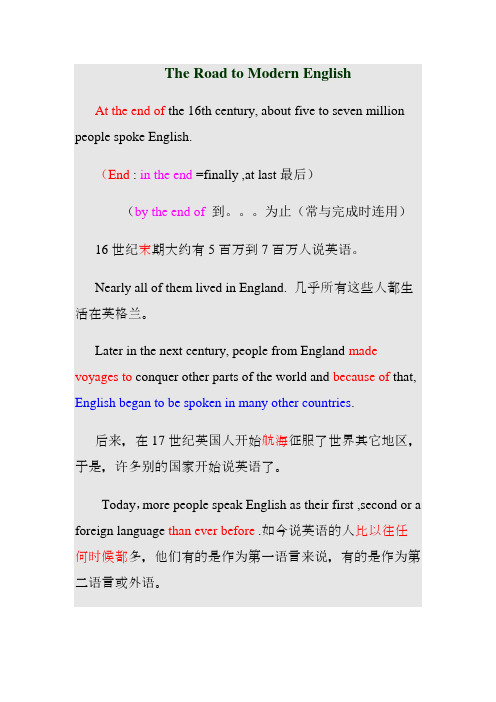
The Road to Modern EnglishAt the end of the 16th century, about five to seven million people spoke English.(End : in the end =finally ,at last最后)(by the end of 到。
为止(常与完成时连用)16世纪末期大约有5百万到7百万人说英语。
Nearly all of them lived in England. 几乎所有这些人都生活在英格兰。
Later in the next century, people from England made voyages to conquer other parts of the world and because of that, English began to be spoken in many other countries.后来,在17世纪英国人开始航海征服了世界其它地区,于是,许多别的国家开始说英语了。
Today,more people speak English as their first ,second or a foreign language than ever before .如今说英语的人比以往任何时候都多,他们有的是作为第一语言来说,有的是作为第二语言或外语。
Native English speakers can understand each other even if they don’t speak the same kind of English.以英语作为母语的人,即使他们所讲的语言不尽相同,也可以互相交流。
Look at this example:请看以下例子:British Betty: Would you like to see my flat ?American Amy: Yes, I’d like to come up to your apartment.英国人贝蒂:“请到我的公寓(flat)里来看看,好吗?美国人艾米:“好的。
人教版高一英语必修一Unit2全
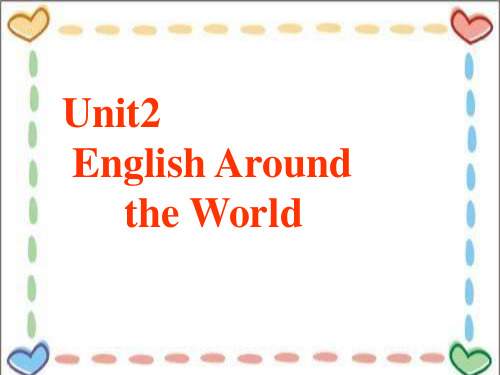
【答案】 A
5.make use of 利用 【用法】use前可用good,full,poor, little等词修饰。如: As a student, you must make full use of your spare time. 作为学生,你必须充分利用课余时间。 Make good use of every chance to practise speaking English and your spoken English will be better soon. 充分利用每一次练习说英语的机会,那 么,你的英语口语很快就会变好。
I'll tell you later. 我以后再告诉你。 3)latter最常用的含义是“两者中的(后者)”, 常与the连用,固定搭配“the former…, the latter…”。如: Here are Tom and David; the latter is my brother. 这是汤姆和戴维;后者是我的兄弟。 4)lately是副词,意为“近来,最近 recently”。如: Have you been to Beijing lately? 你最近去过北京吗?
3.base 基础;基地;根基 (1) n.___________________ Eg: Our company’s base is in beijing. 建于…之上;以…为基础 (2) vt. ____________________ 用法:base A on B A以B为基础 被动 A be based on B A建于B基础之上 Eg: (1)One should always base his opinion on facts. 被动 One’s opinion should always be based on facts.
【新人教版】高一英语上册必修一同步课件Unit 2 Travelling Around (课文课件)
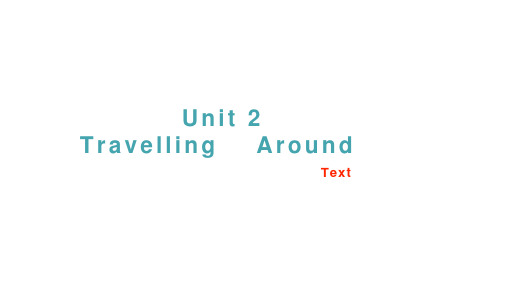
Exercise
• It was after he got what he had desired was not so important.
he realized it
A. that
B. when
C. since
D. as
• That was a really splendid evening. It's years
Proverbs.
• A traveller without observation is a bird without wings. • To travel is to discover that everyone is wrong about other countries. • I see my path, but I don't know where it leads. • Not knowing where I'm going is what inspires me to travel it.
• 倒装语序中又有完全倒装(Full Inversion)和部分倒装(Partial Inversion)。
完全倒装:指将句子中的谓语全部置于主语之前。
• 1) here, there, now, then, thus等副词置于句首, 谓语动词常用 be, come, go, lie, run。
• There goes the bell. / Here is your letter. • 2) 表示运动方向的副词或地点状语置于句首,谓语表示运动的动
Number of days
Amazon Rainforest
4 days
Machu Picchu 4 days
人教版高中英语新教材必修一 book1 unit2单词课件
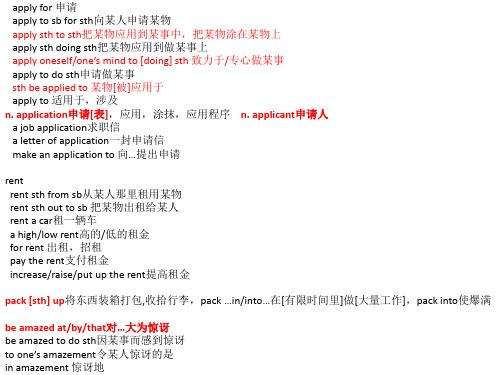
n. recognition 识别,承认,认出 recognize sb/sth by/from… 通过…认出某人或某物 recognize…as/to be… 把…看作/认为是… be recognized as / to be被看作/认为是 recognize that+从句 承认… it’s recognized that... 人们意识到…. beyond/out of recognition 认不出来
extremely adv. 极其,非常 常放在形容词前,修饰形容词---extremely beautiful
extreme adj. 非常的
extreme dangere极端的危险
a narrow escape 九死一生 narrow-minded 心胸狭窄的,气量小的 narrow the gap between…and… 缩小...与…之间的差距 narrow down减少,缩小,限制 narrow one’s eyes眯起眼睛 adv. Narrowly 勉强地 n. narrowness 狭窄,狭隘
arrangement make arrangements/an arrangement for为…做准备/安排 arrive at/come to/conclude an arrangement [with sb] [和某人]谈妥,达成协议
arrange v. arrange for sth安排某事 arrange to do sth安排做某事 arrange sth for sb为某人安排某事 arrange for sb to do sth安排某人做某事
人教版英语必修一unit2reading

人教版英语必修一unit2reading1、UnitTwo:ReadingTheRoadToModernEnglish?Howmanydialects方言arethereinChina?dialectsfamilyinChinaChinese北方方言吴语赣语闽南语湘语客家话粤语Warmingup–II(2m)DoyouthinktherearesomedialectsinEnglish?BritainTheU.S.AEnglishd ialectsinCanadadifferentAustraliacountriesIndiaNewZeal and……..BrEAm. EWhenyouheartwonativespeakersofEnglish,theymaysti2、llnotspeakthesamekindofEnglish.ThedifferencesbetweenBritishEnglishand AmericanEnglish.BrEAmEChineseBrEAmE电梯liftelevatorpetrolgas,gasoline 汽油公寓flatapartment秋天autumnfall地铁undergroundsubway大学universitycollege垃圾rubbishgarbage垃圾箱dustbintrashcan假期holidayvacation两周fortnighttwoweeksMatchthewordsthathavethesamemeaning.pet3、roleraserflatgascolorapartmentliftelevatorrubberhonourhonorcolourpict uresmoviesundergroundsubwaySkimming1.Englishhas/hadthemostspeakers___ .A.nowB.whentheBritishruledmanypartsoftheworldC.inthetimeofShakespear eD.inthe12thcentury2.Whichofthefollowingstatementistrue?nguagesal nguageschangeonly4、nguageschangewhencultureschange 3.FromAD450to1150,Englishsoundedmorelike_____?A.FrenchB.ChineseC.Germ anD.Russian4.Shakespeare’sEnglishwasspokenaround______?A.1400’sB.11 50’sC.450’sD.1600’s5.WhichcountryhasthefastestgrowingnumberofEngli shspeakersintheworld?A.AustraliaB.ChinaC.5、IndiaD.BritainPara1BriefintroductionofthechangeinEnglish.简介英语改变TimeWho(howmanypeople)spokeEnglishTheendofthe16thAbout5-7millionpeopl e,mostlycenturyLivinginFnglandLaterinthenextcenturyConquerotherparts, spokeninmanyothercountriesTodayMorepeoplespeakEnglishthanbeforePara2I fanAmericanistalkingtoanEnglishman,___A___6、_.A.TheywillhavealmostnodifficultyinunderstandingB.Theywillhavealotof misunderstandingsbetweeneachotherC.TheAmericanfindsitdifficulttounder standtheEnglishmanD.TheEnglishmanfindsitdifficulttofollowtheAmericanR eadPara3andanswerthequestion:WhydoesEnglishchangeovertime?Becauseofcu lturalcommunication.ThehistoryoftheE7、nglishlanguageTheroadtomodernEnglishAD450-Englishwasbasedmoreon_G__e_ r_m_a_n.1150AD800-Englishbecame__l_e_s_slikeGerman1150Becausethosewho _r_u_l_e_dEnglandspokefirstDanishandlaterFrench.Inthe_S_h_a_k__e_s_p_ e_a_r_e_madeuseofawider1600svocabularythaneverbefore.TheroadtomodernE nglishIn1620SomeBritishsettlersmoved8、to_A_m__e_r_ic_a__.LaterinSomeBritishpeopleweretakentothe18th_A_u__st _r_a_l_ia__.centuryBytheTheEnglishlanguagewassettled.19thTwobigchange sin_E_n_g_l_is_h__s_p_e_ll_in_g__centuryhappened:SamuelJohnsonwrotehi s_d_ic_t_io_n_a_r_y__andNoahWebsterwrote_T_h_e__A_m_e_r_i_c_a_n_D__ic _t_io_n_a_r_y_o_f_______th__e_E_n_g_9、l_i_sh__L_a_n_g_u_a_g_e_._TwoimportantpersonsinPara4SamuelJohnsonBorn :September18,1709WriteadictionaryOneoftheEnglishlanguage’smostprofou ndinfluences.(最深的影响)NoahWebsterBorn:October16,1758Died:May28,1843WhenNoahwas43,hestart edwritingthefirstAmericandictionary.HedidthisbecauseAmericansindiffer entpartsofthecountry10、spelled,pronouncedandusedwordsdifferently.Para5WhyisIndiamentionedint helastparagraph?AA.BecauseIndiaisatypical(独特的)countrywhospeaksEnglishasasecondlanguagebecauseofitslongbeingruled byBritain.B.BecauseIndiahasaverylargenumberofEnglishspeakers.C.Becaus eIndiaisacountrywhereEnglishplaysaveryimportantroleinsociallif11、e.D.BecauseIndiahasalonghistoryofcommunicationwithBritain.Retellthete xt.Atfirst,onlypeoplein_E_n__g_la_n_d_ter,peoplefromEn gland__m_o_v_e_d_tootherparts,soEnglishbegantobespokenin_m__a_n_y__o_ th_e_r__c_o_u_n_t_r_ie_s_.Today,___m__o_r_epeoplespeakEnglishastheir_ _fi_r_s_t,secondorforeignlanguage.__12、N_a_t_iv_e_Englishspeakers__c_a_n_understandeachotherbut__n_o_t__e_v_ e_r_y_th_i_n_g_.Alllanguageschangewhen__c_u_l_tu_r_e_scommunicatewith oneanother.SothereareBritishEnglish,AmericanEnglish,AustralianEnglish andsoon.Theyallhavetheirown__i_d_e_n_ti_t_y.Englishisalsospokenasafor eignorsecondlanguagein_m__a_n_y_o_t_13、h_er_c_o_u_n_tr_ie_s.MaybeonedayChineseEnglishwillbecomeoneoftheworld English.DiscussionYoucanchooseoneofthequestionstotalkaboutinGroups(Pa ge10):1,WhydoyouthinkpeopleallovertheworldwanttolearnEnglish?2,Whydoy outhinkmorepeopleintheworldwanttolearnChinese?TouseforTouseinschoolbu sinessWhydosomanyTotalkpeoplewanttoT14、oreadtonativelearnEnglish?EnglishspeakersbooksTowritetopenTolistentof riendsEnglishmusicandmovies “曾经有一份真诚的爱情摆在我的面前,但是我没有珍惜,等到了失去的时候才懊悔莫及,尘世间最苦痛的事莫过于此。
人教新课标高中英语必修一Unit 2 English around the world课件

BritishEnglish
10
BritishEnglish
AmericanEnglish
spelling
pronunciation
colour, favourite, theatre, centre, travelled, metre
color, favorite, theater, center, traveled, meter
2.Prepareforthenextclass. 3.FinishtheexercisesonWB.
19
20
Period3Learningaboutl anguage
Unit2Englisharoun dtheworld
21
Period3:幻灯片27-48页
Revision(3m)
Match:(Reivewthenewwords)
dtous. Themonitortoldusnottoplaygamesintheclassroom. “Willyoupleasenotsmokehere?”sheadded. Sheaskedmenottosmokehere.
29
Learningusefulstructure–IV(10m)
apartment
autumn
fall
underground(地铁) subway university(大学) college
rubbish(垃圾) garbage
dustbin(垃圾箱) trashcan
holiday
vacation
fortnight(两星期)twoweeks
12
Reading–I(3m)
Paragraph2:tellsusnativespeakerscanund erstandeachotherbutnoteverything.
(完整版)必修一unit2TheroadtomodernEnglish课文原文
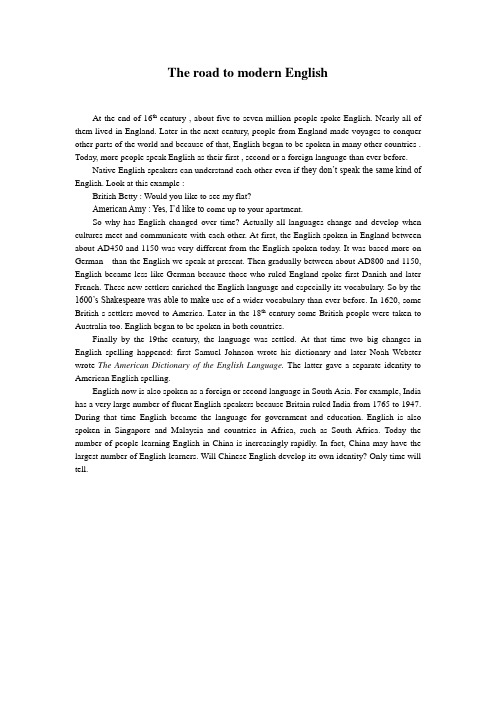
The road to modern EnglishAt the end of 16th century , about five to seven million people spoke English. Nearly all of them lived in England. Later in the next century, people from England made voyages to conquer other parts of the world and because of that, English began to be spoken in many other countries . Today, more people speak English as their first , second or a foreign language than ever before.Native English speakers can understand each other even if they don’t speak the same kind of English. Look at this example :British Betty : Would you like to see my flat?American Amy : Yes, I’d like to come up to your apartment.So why has English changed over time? Actually all languages change and develop when cultures meet and communicate with each other. At first, the English spoken in England between about AD450 and 1150 was very different from the English spoken today. It was based more on German than the English we speak at present. Then gradually between about AD800 and 1150, English became less like German because those who ruled England spoke first Danish and later French. These new settlers enriched the English language and especially its vocabulary. So by the 1600’s Shakespeare was able to make use of a wider vocabulary than ever before. In 1620, some British s settlers moved to America. Later in the 18th century some British people were taken to Australia too. English began to be spoken in both countries.Finally by the 19the century, the language was settled. At that time two big changes in English spelling happened: first Samuel Johnson wrote his dictionary and later Noah Webster wrote The American Dictionary of the English Language. The latter gave a separate identity to American English spelling.English now is also spoken as a foreign or second language in South Asia. For example, India has a very large number of fluent English speakers because Britain ruled India from 1765 to 1947. During that time English became the language for government and education. English is also spoken in Singapore and Malaysia and countries in Africa, such as South Africa. Today the number of people learning English in China is increasingly rapidly. In fact, China may have the largest number of English learners. Will Chinese English develop its own identity? Only time will tell.。
- 1、下载文档前请自行甄别文档内容的完整性,平台不提供额外的编辑、内容补充、找答案等附加服务。
- 2、"仅部分预览"的文档,不可在线预览部分如存在完整性等问题,可反馈申请退款(可完整预览的文档不适用该条件!)。
- 3、如文档侵犯您的权益,请联系客服反馈,我们会尽快为您处理(人工客服工作时间:9:00-18:30)。
Unit 2 English around the world
The road to modern English
At the end of the 16th century, about five to seven million people spoke English. Nearly all of them lived in England. Later in the next century, people from England made voyages to conquer other parts of the world and because of that, English began to be spoken in many other countries. Today, more people speak English as their first, second or foreign language than ever before.
Native English speakers can understand each other even if they don’t speak the same kind of English. Look at this example:
British Betty: Would you like to see my flat?
American Amy: Yes. I’d like to come up to your apartment.
So why has English changed over time? Actually, all languages change and develop when cultures meet and communicate with each other. At first, the English spoken in England between about AD 450 and 1150 was very different from the English spoken today. It was based more on German than the English we speak at present. Then gradually between about AD 800 and 1150, English became less like German because those who ruled England spoke first Danish and later French. These new settlers enriched the English language and especially its vocabulary. So by the 1600’s Shakespeare was able to make use of a wider vocabulary than ever before. In 1620 some British settlers moved to America. Later in the 18th century some British people were taken to Australia too. English began to be spoken in both countries.
Finally by the 19th century the language was settled. At that time two big changes in English spelling happened: first Samuel Johnson wrote his dictionary and later Noah Webster wrote The America Dictionary of the English Language. The latter gave a separate identity to American English spelling.
English now is also spoken as a foreign or second language in South Asia. For example, India has a very large number of fluent English speakers because Britain ruled India from 1765 to 1947. During that time English became the language for government and education. English is also spoken in Singapore and Malaysia and countries in Africa such as South Africa. Today the number of people learning English in China is increasing rapidly. In fact, China may have the largest number of English learners. Will Chinese English develop its own identity? Only time will tell.
STANDARD ENGLISH AND DIALECTS
What is standard English? Is it spoken in Britain, the US, Canada, Australia, India and New Zealand? Believe it or not, there is no such thing as standard English. This is because in the early days of radio, those who reported the news were expected to speak excellent English. However, on TV and the radio you will hear differences in the way people speak.
When people use words and expressions different from “standard language”, it is called a dialect. American English has many dialects, especially the midwestern, southern, African American and Spanish dialects. Even in some parts of the USA, two people from neighboring towns speak a little differently. American English has so many dialects because people have come from all over the world.
Geography also plays a part in making dialects. Some people who live in the mountains of the eastern USA speak with an older kind of English dialect. When Americans moved from one place to another, they took their dialects with them. So people from the mountains in the southeastern USA speak with almost the same dialect as people in the northwestern USA. The USA is a large country in which many different dialects are spoken. Although many Americans move a lot, they still recognize and understand each other’s dialects.。
